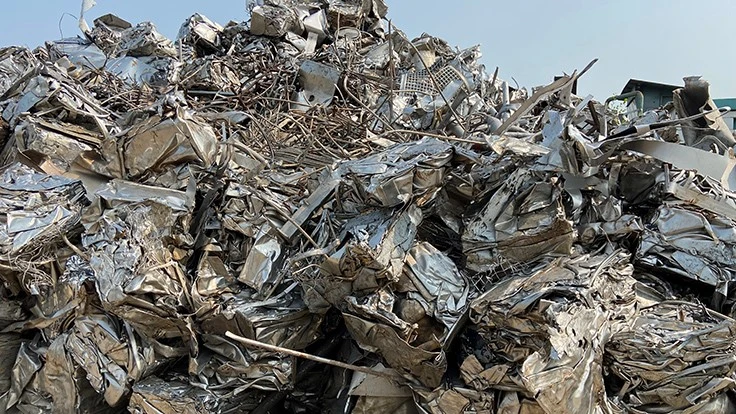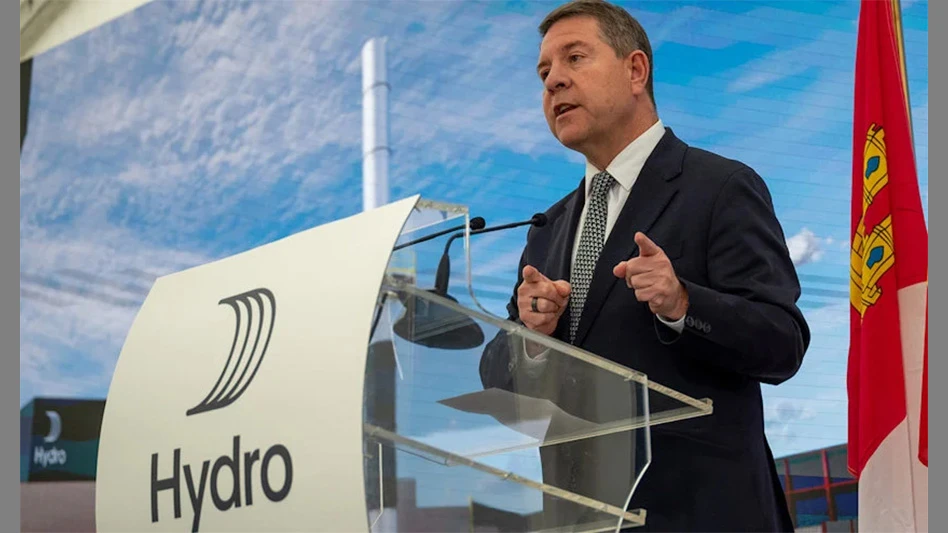
Recycling Today archives
Some of the largest stainless steel recycling companies are based in Europe, which has been the home of an unwelcome percentage of the world’s geopolitical turmoil in 2022. That could be why industry players there have made moves to prepare for an uncertain market in the near-term future.
The factors causing concern in Europe are clear to see: 1) Russia’s invasion of Ukraine, which has reduced the invaded nation’s capacity to produce metal; 2) sanctions against Russia that have made metal produced there unwelcome in some parts of the world, coupled with Russia cutting off European steel producers from some energy supplies; 3) nickel contract trading turmoil on the London Metal Exchange (LME) in the first quarter of 2022; and 4) global electric vehicle (EV) sales momentum that seemingly will place a supply strain on nickel because of the metal’s use in EV batteries.
As good corporate managers are expected to do, executives in the stainless steel production and recycling sector have responded to the conditions with moves designed to prepare them for any and all market conditions.
Contingency planning
Recycling and trading companies well understand the cyclical nature of their business, so retaining access to cash on hand and a healthy balance sheet are always on the agenda.
The second half of 2022 has seen this thought illustrated in announcements by two prominent stainless and specialty alloy recycling companies. In early October, Cronimet Holding GmbH, a Germany-based processing and trading firm, announced it had extended an existing syndicated loan agreement until 2025 with a consortium of 13 European banks.
“The early extension and the increase in the credit volume are a strong sign from the banking market and give us financing security for the upcoming years, which are likely to be rather difficult in view of the current geopolitical and economic environment,” says Bernhard Kunsmann, chief financial officer of Cronimet.
The Cronimet agreement involved an increase of the loan volume by more than 100 million euros ($98 million) to approximately 700 million euros ($686 million), according to the firm. The company also says the financing package includes a credit line that allows Cronimet to “respond more flexibly to the market environment and, in particular, to volatilities in the raw materials markets.”
In August and again in late October, Netherlands-based Oryx Stainless Group announced agreements designed to increase its “financial flexibility” by establishing or extending credit facilities in Europe and Asia.
In Europe, the firm announced a credit line established in August in the amount of 125 million euros ($127 million). In its comments, Oryx stressed opportunity more so than threats.
That arrangement, Oryx says, replaced an existing such facility at what it calls an early stage. The stainless steel recycling and trading company says the move was made “against a background of higher raw material prices and delivery volumes.”
In the announcement, made jointly by Oryx and HSBC Deutschland, the metals trading firm says, “This refinance guarantees sufficient liquidity for further growth planning.” Oryx says the credit agreement serves mainly to finance the working capital of the European Group companies and to provide collateral in connection with its commodity hedging business and adds that the arrangement “is parallel to a credit agreement in Thailand for the Asian business of the group.”
In late October, the company’s Oryx Stainless (Thailand) Co. Ltd. business unit says it had secured an increased line of credit of 1 billion Thai baht ($26.2 million) “to support growing business demand.”
The firm says its new “amendment and restatement agreement” has increased and extended its revolving borrowing base credit facility by 340 million Thai baht ($8.9 million) from 660 million ($17.3 million) Thai baht to 1 billion Thai baht. The extension adds three years to the arrangement.
The moves by both stainless scrap firms point to the notion that volatility and risk in several forms are a concern for producers, users and traders of stainless steel and other nickel products.
Regional differences
Multilocation stainless steel and specialty alloys producer Acerinox S.A., in its most recent earnings report, refers to geopolitical turmoil but also points to regional differences regarding its effects.
The Madrid-based company reports that it shipped less metal in this year’s third quarter compared with last year’s, citing “weakness in apparent demand once the inventory rebuilding process was completed” among some of its customers.
“The change in our customers’ expectations has caused inventories to be high in most markets, starting a regularization process, which we expect to be completed by the beginning of 2023,” Acerinox CEO Bernardo Velázquez says.
In the United States, where the company operates the North America Stainless (NAS) mill in Kentucky, Velázquez says, “The outlook for the American market, our main market, is positive, while the European market is dominated by uncertainty due to the war and high energy prices.”
Looking ahead, Velázquez points to NAS and Acerinox VDM high-performance alloys operations in the U.S. as a likely bright spot in the fourth quarter of this year and into 2023. VDM Metals, which Acerinox acquired in 2020, operates five specialty alloys melt shops in Europe and two in the U.S.
“Our main market, the United States, maintains a better tone than the rest of the markets,” Velázquez says regarding the near-term outlook for Acerinox. “This is expected to continue in the coming months.”
Economic concerns in Europe have focused on the continent’s lack of imported Russian natural gas for the upcoming winter. Expensive natural gas procured on the spot market has allowed many nations to build up their reserves of natural gas. However, those who dislike the cold will not be the only ones rooting for a mild winter, as metals producers and other large-scale energy consumers will be keeping a close eye on the weather.
Get curated news on YOUR industry.
Enter your email to receive our newsletters.
Latest from Recycling Today
- Toppoint Holdings expands chassis fleet
- Lego creates miniature tire recycling market
- Lux Research webinar examines chemical recycling timetables
- Plastics producer tracks pulse of wire recycling market
- Republic Services, Blue Polymers open Indianapolis recycling complex
- Altilium produces EV battery cells using recycled materials
- Brightmark enters subsidiaries of Indiana recycling facility into Chapter 11
- Freepoint Eco-Systems receives $50M loan for plastics recycling facility






